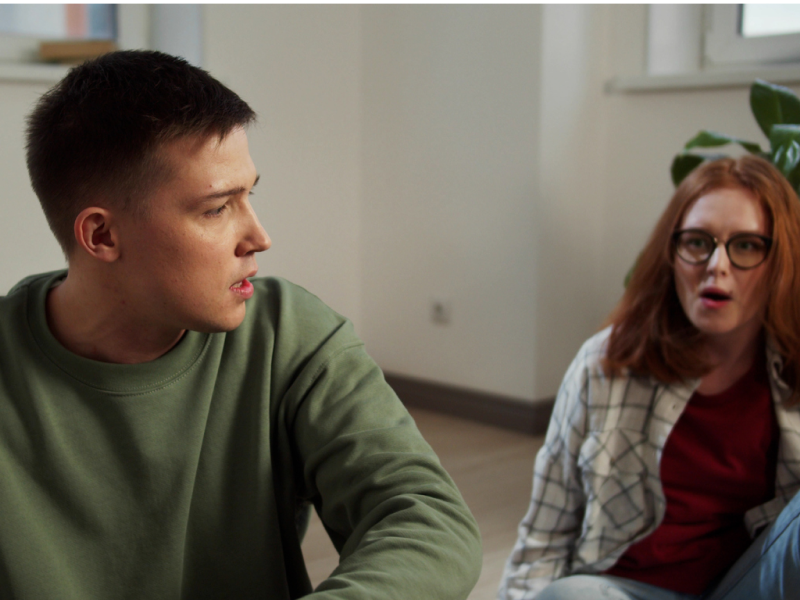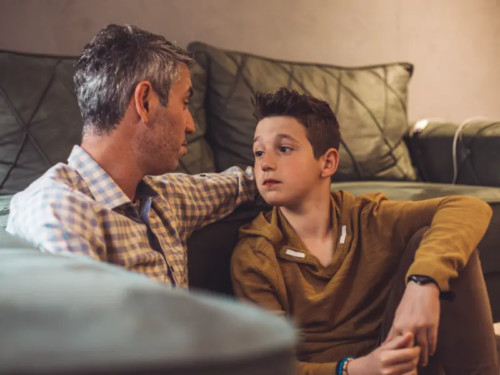
Table of Contents
Complex PTSD Triggers in Relationships

Written By: Alex Bachert, MPH

Clinically Reviewed By: Dr. Don Gasparini
Updated: September 22, 2023
7 min.
Complex post-traumatic stress disorder (C-PTSD for short) can take a toll on relationships. Here’s how to identify complex PTSD triggers and overcome complex PTSD symptoms.
Learn more about our Clinical Review Process
Table of Contents
Complex post-traumatic stress disorder (called complex PTSD or C-PTSD for short) is a mental health condition that can develop due to long-term trauma. It shares many of the same symptoms as PTSD, but while PTSD usually stems from a single event, complex PTSD is caused by long-term, repeated trauma. Living with this type of complex trauma can seriously impact daily functioning and relationships. To maintain healthy relationships (both romantic and platonic), people with complex PTSD need to understand their triggers and develop coping skills to manage them. Keep reading for tips on how to manage complex PTSD in relationships.
Complex PTSD triggers in relationships
A trigger is defined as anything that sparks a memory of trauma or part of a traumatic experience. Some triggers are easy to anticipate or identify, while others may be more subtle and catch a person by surprise. Triggers are specific to people’s unique experiences and perspectives, but common categories of triggers include sights, smells, sounds, and locations.
The tricky thing about triggers is they can relate to any characteristic that represents a previous trauma. For example, smelling food that you ate as a child or hearing a song that was popular during a tumultuous period in your life can be triggers for complex PTSD. Triggers can also be associated with a specific season, holiday, anniversary, or time of day.
Here are a few examples of common complex PTSD triggers in relationships:
Too much stimulation
Large crowds, loud sounds, and bright lights can be triggering for people with complex PTSD, for whom big crowds, loud noises, and bright lights bring up traumatic memories and exacerbate anxiety and stress. People who feel triggered by too much stimulation may avoid big live events like concerts and sports.
Trouble celebrating
For many couples, birthdays and holidays are a time to celebrate and enjoy each other’s company. For someone with complex PTSD, these events may trigger difficult memories of past traumas or dysfunctional family dynamics, causing emotional distress and anxiety.
Overwhelming emotions
Big emotions can cause big problems in relationships where one or both people have complex PTSD. Their past trauma may have included overwhelming emotional experiences, and as a result, strong emotions can remind them of those traumatic events, leading to distress and emotional dysregulation.
Shame spiral
Living with untreated complex PTSD may mean you’re more prone to feeling inadequate or unworthy. If your partner makes you feel ashamed, even if that wasn’t their intention, it may be difficult for you to focus on relational thoughts.
How complex PTSD can affect relationships
You may have heard a friend joke that they have relationship PTSD after going on a few bad dates, but complex PTSD is a serious mental health condition that can negatively affect relationships when left untreated.
We know that complex PTSD can affect people’s lives and their ability to form meaningful relationships. According to the CPTSD Foundation, people require safe people, places, and things during childhood for healthy brain development. Many people with complex PTSD have a history of betrayal from people closest to them, making it difficult to feel safe, secure, and trusting of others. For this reason, they may find it difficult to trust themselves and their partners.
People with complex PTSD may also experience:
- Negative self-image
- Impulsive behavior
- Emotional dysregulation
- Inability to tolerate stress
- Memory issues
- Personality changes
- Poor communication skills
How to manage complex PTSD in relationships
With a supportive, understanding partner, someone with complex PTSD can enjoy a healthy, satisfying relationship. As mentioned, complex PTSD can show up in any type of relationship, but here, we’re going to explore coping strategies for managing complex PTSD in intimate relationships.
Know your triggers
Understanding your PTSD triggers requires time and work, but once you have this knowledge, both you and your partner will be better equipped to navigate difficult situations.
Prioritize open communication
You may feel uncomfortable discussing your thoughts and feelings with your partner, but open communication is essential for ensuring that both people are on the same page. By using “I’ statements, you create an opportunity to cultivate honesty, clarity, and trust in the partnership. For example, if your partner has done something that upsets you, you can respond by saying, “When you do X, it makes me feel X.” This also allows your partner to acknowledge your concerns and clarify the reason for their actions.
Practice self-care
If you struggle with complex PTSD symptoms, self-care is an important step toward improving your mental health. Self-care involves daily habits like eating a balanced diet, drinking enough water, getting enough sleep, and moving your body. It can mean making time for people and activities that bring you joy and exploring new hobbies and friendships to enhance your life. Self-care also means avoiding unhealthy habits and coping methods, such as abusing drugs and alcohol.
Practice self-compassion
Individuals affected by complex PTSD may struggle with feelings of worthlessness or hopelessness, making self-compassion essential. If you’re experiencing low self-esteem or in a rut, try using positive self-talk to remind yourself of your strengths and all that you offer to the world and your relationships.
Seek professional mental health support
As mentioned, when left untreated, complex PTSD can take a real toll on relationships. Psychotherapy, or talk therapy, offers people an opportunity to address their past trauma and develop coping skills to build healthier relationships.

PTSD versus complex PTSD
Complex PTSD was first introduced in the late 1980s by a Harvard University psychiatrist named Dr. Judith Herman. Dr. Herman believed that the traditional PTSD diagnosis did not adequately account for symptoms associated with victims of long-term trauma and advocated for complex PTSD to be its own diagnosis.
Since then, there’s been a bit of a debate among mental health professionals over whether or not complex PTSD warrants its own diagnosis. While the Diagnostic and Statistical Manual of Mental Disorders (DSM-5), the diagnostic guide used by mental health professionals nationally, does not currently recognize complex PTSD as an official diagnosis, the International Disease Classification (ICD-11) includes complex PTSD as a condition separate from PTSD.
The leading difference between PTSD and complex PTSD is the duration of the trauma. While PTSD usually develops due to short-term trauma, such as a car accident or natural disaster, complex PTSD results from extreme trauma that takes place over an extended period of time. Examples of these types of trauma include childhood sexual or physical abuse, domestic violence, torture, chronic poverty or neglect, and organized violence.
Complex PTSD shares many of the same symptoms of PTSD, such as:
- Intrusion: Vivid intrusive memories, flashbacks, or nightmares about the traumatic event
- Avoidance: Avoidance and detachment from people, places, events, and triggers of the trauma
- Alterations in cognition and mood: Distorted thoughts about the cause or consequences of the event, which can lead to ongoing fear, anger, guilt, or shame
- Alterations in arousal and reactivity: Trouble sleeping or concentrating, being easily startled, or having irritable or angry outbursts
In addition to standard PTSD symptoms, individuals with complex PTSD may experience the following symptoms:
- Trouble controlling emotions like anger and aggression
- Negative sense of self and feelings of shame, guilt, failure, and worthlessness
- Difficulty building and maintaining meaningful relationships or feeling close to others
Is it possible to treat complex PTSD?
Although there’s no cure for complex PTSD, there are several treatment options to help manage symptoms.
Cognitive behavioral therapy (CBT)
CBT is used to help with a wide range of mental health conditions, including complex PTSD. CBT teaches people to reframe negative beliefs, address unhealthy behaviors, and develop coping skills to manage difficult emotions and situations. Trauma-focused CBT, which, as its name suggests, is geared toward treating trauma, may be specifically helpful for people with complex PTSD because it helps people address and process traumatic experiences, reduces avoidance behaviors, and teaches effective coping strategies, leading to symptom relief and improved overall mental health.
Eye movement desensitization and reprocessing (EMDR)
This therapeutic method involves eye movement techniques, such as back-and-forth movements, to help process traumatic and triggering emotional memories. EMDR may help people with complex PTSD process and desensitize distressing memories and emotions, enabling them to reframe their traumatic experiences and reduce symptoms like flashbacks and hypervigilance.
Exposure therapy
Exposure therapy gives people a chance to revisit triggers with the support of a therapist, with the ultimate goal being to desensitize themselves to them—a therapeutic modality that may benefit people with complex PTSD. An example of exposure therapy is sharing the details of a traumatic event out loud.
Get help for complex PTSD at Charlie Health
If you or someone you love is dealing with complex PTSD, Charlie Health is here to help.
Our virtual intensive outpatient program (IOP) provides personalized care for teens, young adults, and families dealing with various mental health conditions, including trauma and PTSD. Charlie Health’s program combines individual therapy, family therapy, and facilitated groups focused on collective healing to offer more than once-weekly support to those who need it.
Dealing with complex trauma can feel overwhelming and even hopeless at times, but having access to trauma-informed care and a supportive community can make a huge difference. Charlie Health’s clinicians are trauma-informed and well-equipped to help you process your trauma in a safe, non-judgmental space.
Fill out this short form and get started healing today.
References
https://www.ncbi.nlm.nih.gov/books/NBK207191/
https://www.ncbi.nlm.nih.gov/pmc/articles/PMC5862650/
https://cptsdfoundation.org/what-is-complex-post-traumatic-stress-disorder-cptsd/
https://icd.who.int/browse11/l-m/en#/
https://www.ncbi.nlm.nih.gov/books/NBK207191/
https://www.psychiatry.org/patients-families/ptsd/what-is-ptsd





